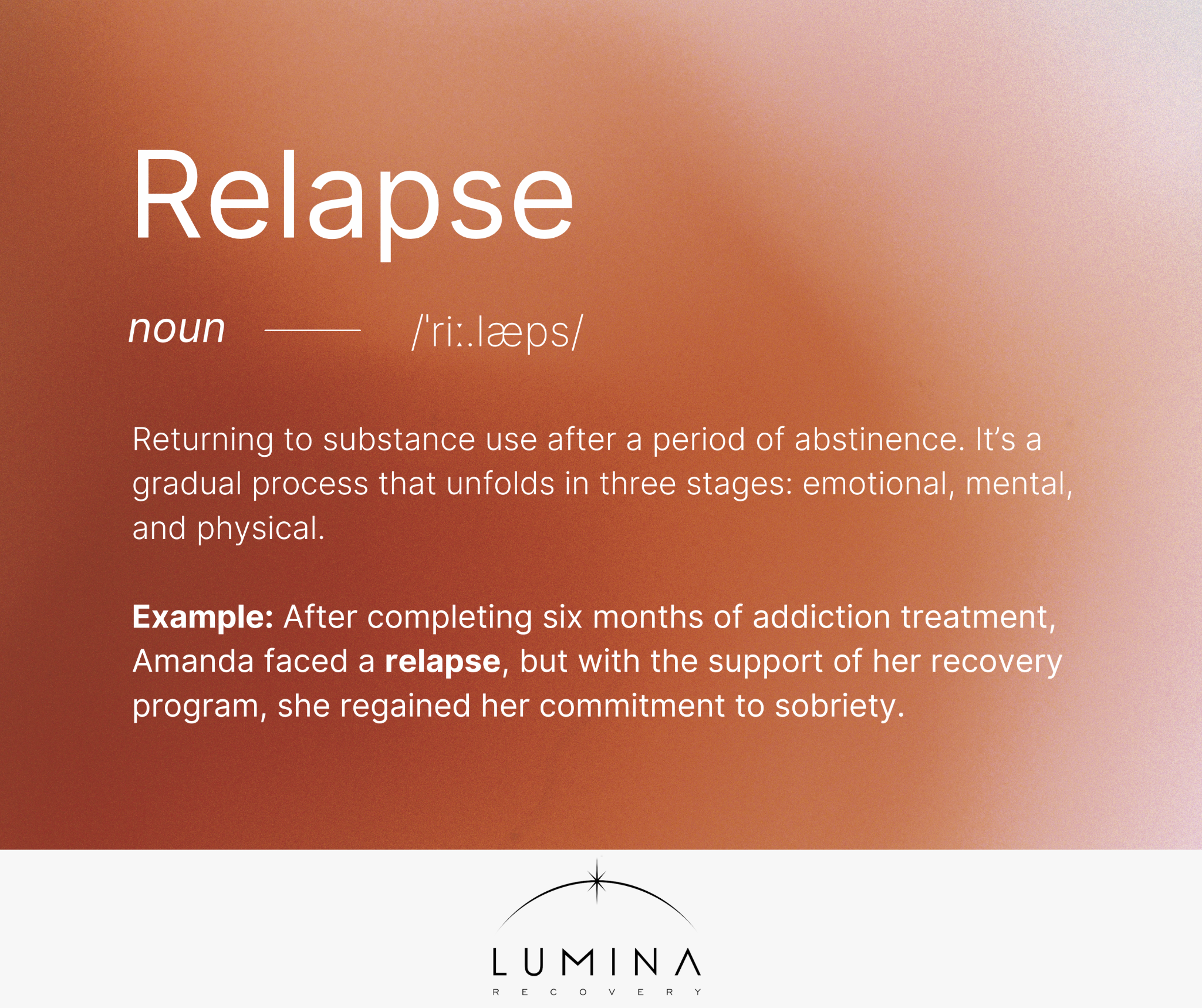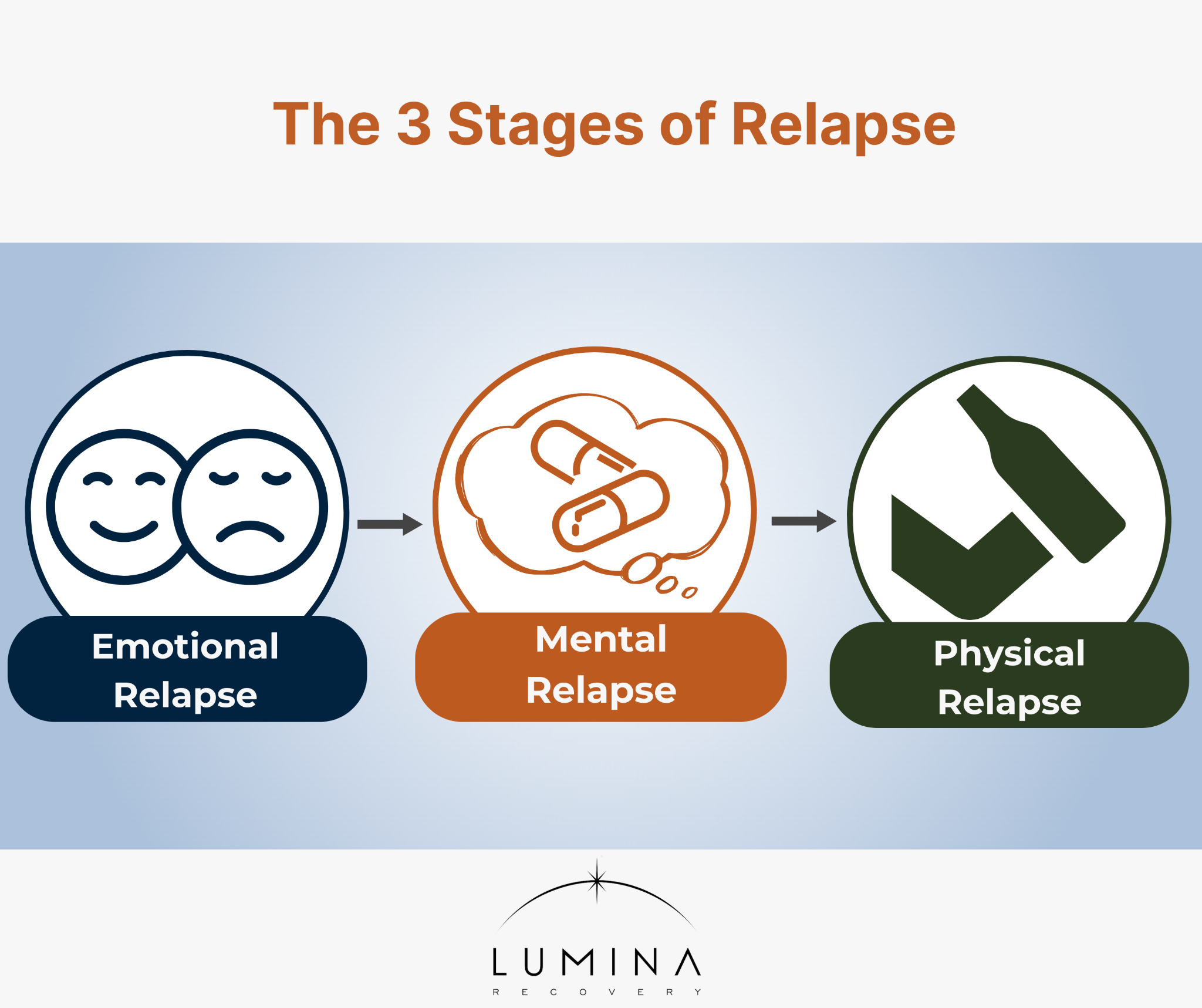Relapse is a common challenge in addiction recovery, but it is not an instant or isolated event. Instead, it follows a process with identifiable stages, allowing individuals and their support systems to recognize warning signs and take preventive action.
Understanding the stages of relapse can empower individuals to develop coping strategies, reduce the risk of setbacks, maintain long-term sobriety, and learn what to do when a loved one relapses.
What Is Relapse?
What does it mean to relapse? The definition of relapse in addiction refers to returning to substance use after a period of abstinence. It’s a gradual process that unfolds in three stages: emotional, mental, and physical. Recognizing these relapse stages can help individuals intervene before substance use resumes.
Recovery is a lifelong journey, and relapse does not mean failure. It highlights areas that need reinforcement and adjustment in a person’s recovery plan. Understanding the meaning of relapsing and the stages of the relapse process is crucial to successful relapse recovery.
The 3 Stages of Relapse
Recognizing the warning signs and relapse phase meanings is crucial for maintaining long-term recovery. The three stages of relapse each present different challenges that can be addressed with proper support and intervention.
1. Emotional Relapse
Emotional relapse is the first stage, occurring before an individual consciously considers using substances again. During this phase, individuals may experience:
- Mood swings and increased irritability
- Isolation from friends, family, and support groups
- Neglect of self-care, such as poor eating and sleeping habits
- Bottling up emotions rather than expressing them
At this stage, people are not actively thinking about using substances, but their behaviors and emotions may set the groundwork for future relapse. This stage represents the early warning signs of a potential drug relapse.
2. Mental Relapse
In the second stage, internal conflict emerges. A person starts thinking about using again, even though part of them wants to stay sober. Signs of mental relapse include:
- Cravings for substances
- Romanticizing substance use and forgetting its negative consequences
- Lying about struggles and hiding emotions from others
- Seeking out situations where substance use is possible
- Planning a potential relapse, rationalizing that they can control it
Recognizing these warning signs is crucial for preventing progression to the final stage. The phases and warning signs of relapse are most evident during this stage, as individuals may begin engaging in behaviors that put them at risk of using again.
3. Physical Relapse
Physical relapse is the act of returning to substance use. It often begins with a “lapse,” which is a single use, but can quickly escalate into uncontrolled substance use. This stage is often accompanied by feelings of guilt, shame, and frustration. Preventing physical relapse requires early intervention in the emotional relapse and mental relapse stages.
Despite efforts to stay sober, a person may engage in substance use again. While it can be discouraging, relapse recovery is possible with the right support and strategies. Understanding the three stages of relapse can help individuals recognize where they are in the relapse cycle and take action.
Factors Contributing to Relapse
Relapse does not happen randomly—it is often triggered by specific factors that make maintaining sobriety more challenging. Knowing these contributing factors can help individuals take proactive steps to prevent relapse.
1. Triggers
Triggers are external or internal factors that lead to cravings and increase the likelihood of relapse. Common triggers include:
- Stress and anxiety
- Environmental cues, such as places associated with past use
- Social settings where substances are present
- Negative emotions like sadness, anger, or loneliness
2. High-Risk Situations
Certain scenarios significantly increase relapse risk, including:
- Attending events where alcohol or drugs are readily available
- Spending time with individuals who still use substances
- Experiencing significant life changes, such as job loss or relationship problems
3. Coping Mechanisms
Individuals with inadequate coping strategies are more vulnerable to relapsing. Without effective methods to manage stress and emotions, they may turn back to substances for relief. Developing healthy coping mechanisms is a key part of relapse prevention.
Relapse Prevention Strategies
Preventing relapse requires a proactive approach that involves recognizing triggers, developing prevention skills, and building a strong support system. By implementing effective strategies, individuals can strengthen their resilience and maintain long-term recovery.
1. Developing Healthy Coping Skills
Practicing self-care and building resilience are essential for preventing drug relapse. Effective coping techniques include:
- Mindfulness and meditation to manage stress
- Regular exercise to improve mood and reduce cravings
- Engaging in hobbies to occupy time and provide fulfillment
- Journaling to process emotions constructively
2. Building a Support System
Recovery is not a solo journey. A strong support network can make a significant difference. Support may come from:
- Family and friends who encourage sobriety
- Support groups and group therapy
- Addiction counselors or sponsors who provide guidance
3. Creating a Relapse Prevention Plan
A personalized relapse prevention plan helps individuals recognize and respond to relapse phase warning signs. A strong relapse prevention plan includes:
- Identifying personal triggers
- Developing coping strategies
- Listing emergency contacts
- Having an accountability partner
FAQs
What does relapse mean?
Relapse is the return to substance use after a period of sobriety. It is a process that occurs in stages and can be prevented with proper intervention.
Is relapse a part of recovery?
Many individuals experience relapse multiple times during recovery. While it is not a required step, it is a common challenge that can be overcome with support and prevention strategies.
How long does a relapse usually last?
The duration of relapsed substance use varies. Some individuals may experience a single-use lapse, while others might struggle with prolonged substance use before seeking help again.
What is a relapse cycle?
A relapse cycle refers to the pattern of progressing through the three stages of relapse, from emotional relapse to mental relapse, and ultimately physical relapse.
What precedes a relapse?
Common precursors to relapsing include stress, isolation, exposure to triggers, lack of self-care, and failure to address emotional struggles.
Overcome Relapse and Move Forward With Lumina Recovery
Relapse is a part of many recovery journeys, but it does not define a person’s success. By recognizing the stages of relapse, identifying personal triggers, and developing effective coping strategies, individuals can regain control and continue their path to sobriety.
At Lumina Recovery, we offer inpatient treatment and cognitive behavioral therapy (CBT) to help individuals strengthen their resilience and build long-term recovery.
If you or a loved one needs support, contact us today to start your journey toward lasting healing.





